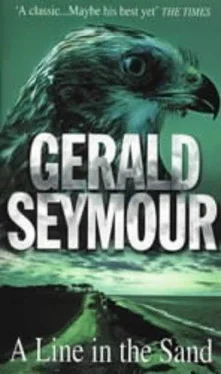Gerald Seymour - A Line in the Sand
Здесь есть возможность читать онлайн «Gerald Seymour - A Line in the Sand» весь текст электронной книги совершенно бесплатно (целиком полную версию без сокращений). В некоторых случаях можно слушать аудио, скачать через торрент в формате fb2 и присутствует краткое содержание. Жанр: Триллер, на английском языке. Описание произведения, (предисловие) а так же отзывы посетителей доступны на портале библиотеки ЛибКат.
- Название:A Line in the Sand
- Автор:
- Жанр:
- Год:неизвестен
- ISBN:нет данных
- Рейтинг книги:3 / 5. Голосов: 1
-
Избранное:Добавить в избранное
- Отзывы:
-
Ваша оценка:
- 60
- 1
- 2
- 3
- 4
- 5
A Line in the Sand: краткое содержание, описание и аннотация
Предлагаем к чтению аннотацию, описание, краткое содержание или предисловие (зависит от того, что написал сам автор книги «A Line in the Sand»). Если вы не нашли необходимую информацию о книге — напишите в комментариях, мы постараемся отыскать её.
A Line in the Sand — читать онлайн бесплатно полную книгу (весь текст) целиком
Ниже представлен текст книги, разбитый по страницам. Система сохранения места последней прочитанной страницы, позволяет с удобством читать онлайн бесплатно книгу «A Line in the Sand», без необходимости каждый раз заново искать на чём Вы остановились. Поставьте закладку, и сможете в любой момент перейти на страницу, на которой закончили чтение.
Интервал:
Закладка:
Fenton was gone, without a backward glance. The car swept out of the parking area.
The theatre over, the uniforms, the detectives and the military trooped back into the police station. Geoff Markham thought that if the young man failed it would be Fenton's neck for breaking. As the car disappeared down the road, he realized that no bag had been dumped with the tracker and his dogs.
"Damn, your bag's still in the car."
"Don't have a bag."
"Clean clothes and so on."
"Don't have a bag."
Markham laughed out loud. Who needed clean socks, who wanted fresh underwear, who had to wash?
"Do you like something to eat?"
"No."
"Do you want anything?"
"No."
"What would you like to do?"
"Get there."
There had once been ambition in Mr. Hackett's ministry, but that was long gone. He existed now in this coastal parish, believing his congregation and his community were beneath his talents, on a diet of godless weddings, hurried funerals and a continuing~nxiety about the maintenance of the fabric of his church. His welcomin1 smile, his proffered friendship were shams. He was lonely, he was better; his wife lived away and the fiction that explained her absence involved her need to care for an elderly, bedridden mother, but she had left him. He lived out his life in the village, kept trouble from his door and the bishop off his back, and waited for retirement, blessed release. The ambition of the Reverend Alastair Hackett, then an inner-city curate on a fast-promotion track, had ended twenty-seven years earlier in the north Welsh mountains when he had taken a party of deprived children, with volunteer helpers, from their Manchester tower blocks for a camping holiday. It was the sort of expedition blessed by bishops, the sort of trip that was good for advancement.." and an eleven-year-old boy had died in a fall. Such a long time ago, but there was no forgiveness in the file that passed from bishop to bishop each time he had applied for subsequent promotion. The file held the muted criticism, unspecified but hinted at, of the police evidence at the subsequent inquest why had the child been alone, why had the child not been better supervised?
His career had never recovered, and the bitterness lingered still. Its target was sometimes the bishops, who did not seem to understand the problems of watching over eighteen hooligan youngsters, but most particularly the police. That bitterness verged on detestation. When he should have been explaining the circumstances of the accident to his bishop, and comforting the bereaved parents, he had been incarcerated in a bare interview room in the police station at Conway, treated like a felon, quizzed relentlessly by men seeming determined to find inconsistencies in his account. The career gone, ambition fallen, he had moved from Manchester to mid-Devon, then taken this Suffolk parish. It was a blighted life, no fault of his own, and empty.
They were in the village. If Geoff Markham spoke, he won a grudging response. If he didn't speak there was silence.
Did he want to go up the church tower, use it as an observation point? A grunt, a shaken head. Did he want to take a look at the house? Again, a similar response.
While he had driven, Chalmers had spread across his knees the map on which a red-ink line marked the trail the police dogs had found, and the riverbank where they had lost it. By Chalmers's boots, the dogs chewed noisily at the car's floor mat. Markham was pretty damn certain that one, maybe both, had peed during the journey.
The smell reeked through the car. He stopped near to the hall, down the road from the green. Chalmers's brow was furrowed in concentration as he studied the detail of the map.
A young woman with a guidebook was sitting on a bench, her back to them. An older woman was coming out of the shop with a wheeled shopping bag. He ignored the slow life of the village around him and busied himself with putting new batteries into the second radio then checked the transmission between the two… Shit, the stress snatched at Markham. Hadn't rung Vicky, and he didn't know the terms of employment offered him. Hadn't spoken to Bill Davies, didn't know whether they were still on their feet or down on the floor. Hadn't remembered the picture. Chalmers eased out of the car, took a little of the smell with him, but not enough. The mat was chewed and puddled and he seemed not to notice. Markham took the picture out of his briefcase, locked the door after him.
"Sorry about that sorry I didn't give it you earlier you should have had it before."
He didn't know why he should be frightened into abject apologies to this stinking kid. He passed over the picture. It was the first time he had seen anything other than hostility in Chalmers's eyes. He had once been to a boxing match, when he was at college, for a middleweight title. He remembered the first sight of the men when they had come into the ring with the hype blaring over the loudspeakers, and it was supposed to be a grudge match. There had been no hate in their eyes, only respect, and the fight had started. Each had done his bloody damnedest to batter the other to the canvas. The bout had been brutal and merciless, and he'd hated it.
He took back the picture, and they walked away, following the map's trail.
Chalmers unpicked a piece of cotton thread from a strand of barbed-wire topping a garden fence and said that the man wore a camouflage tunic.
Where the path narrowed, Chalmers stopped, hunched down and studied the ground beside the path's mud. Half hidden by squashed nettles, a boot print was just visible. Chalmers said the man was size eleven, and added casually that he was hurt, handicapped.
They were beside the river. Chalmers unhooked the twine from the dogs' throats but cooed softly to them. They stayed at his heel.
Ahead were the marshes. The grey cloud was low on the reed-beds. The rain spat on their faces. Chalmers gestured to his right, a contemptuous short motion of his arm, and Markham saw the movement of the policemen in bushes away on higher ground. The marshes stretched ahead to the mist-line and the far, dull shape of the trees. There was the slow thunder of the waves on shingle beyond the sea wall.
"Get lost," Chalmers growled.
"When'll I see you?"
"Some time, when I'm ready. Go away."
Geoff Markham walked back down the path alongside the river. He turned once, looked round, and the path behind him was empty.
Bill Davies flushed the downstairs lavatory, and came back into the hall. Nothing for him to do but drink coffee and ruminate on the catastrophe of the evening before, which he'd been doing all morning. Perry had been looking like chilled death when Davies had come in first thing to relieve Blake and was now pacing the living room. Meryl was in the kitchen, quiet, and she'd only been out the once, to hang her washed dress on the line. Paget had been with her, scanning the bottom fence all the time she'd pegged it up, and the rest of the clothes from the machine. He heard a sudden clatter of sound from the kitchen and knew that with a numbed mind and clumsy fingers she'd dropped a plate, broken it. He glanced out through the window, through the new net curtains. There was a spit of rain misting the glass but he saw the tall, wiry man's clerical collar. He moved aside the curtain for a better glance. Mr. Hackett's name hadn't been scratched off the list by the kitchen telephone.
It was reflex, not thought through.
He spoke on his radio to the hut, said he'd be outside, to the front of the house.
He went out into the light rain. He ran across the green, past the new tree and the new post, towards the clergyman.
"Excuse me."
The man stopped in mid-step, turned, the wind catching his greying hair.
"Excuse me are you Mr. Hackett?"
"He is me." A piping voice and a thin smile of greeting.
Читать дальшеИнтервал:
Закладка:
Похожие книги на «A Line in the Sand»
Представляем Вашему вниманию похожие книги на «A Line in the Sand» списком для выбора. Мы отобрали схожую по названию и смыслу литературу в надежде предоставить читателям больше вариантов отыскать новые, интересные, ещё непрочитанные произведения.
Обсуждение, отзывы о книге «A Line in the Sand» и просто собственные мнения читателей. Оставьте ваши комментарии, напишите, что Вы думаете о произведении, его смысле или главных героях. Укажите что конкретно понравилось, а что нет, и почему Вы так считаете.












